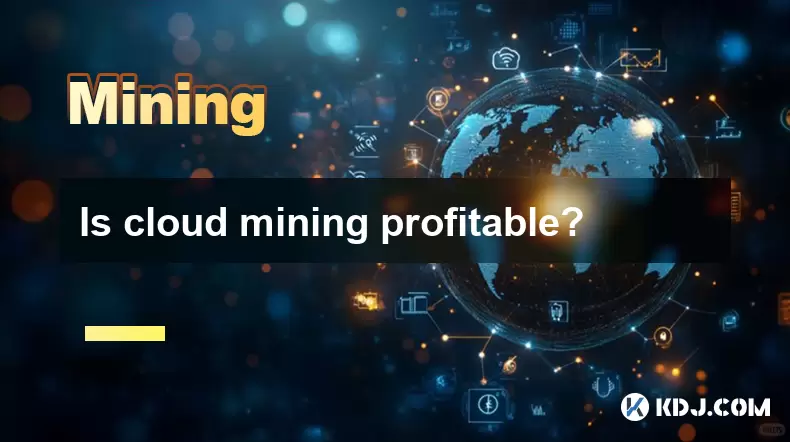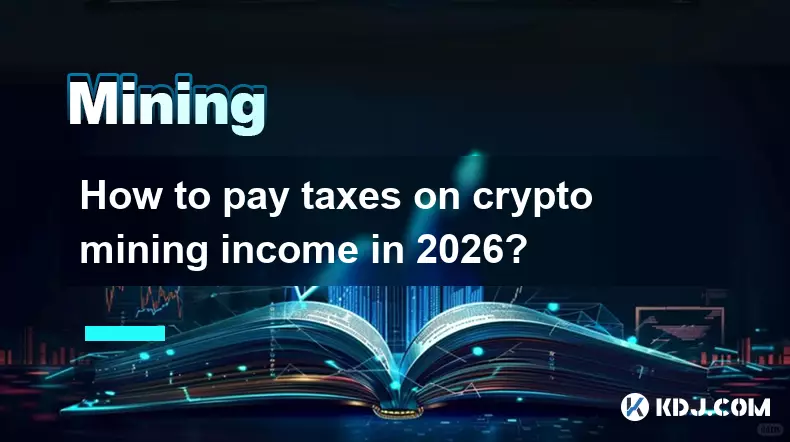-
 bitcoin
bitcoin $87959.907984 USD
1.34% -
 ethereum
ethereum $2920.497338 USD
3.04% -
 tether
tether $0.999775 USD
0.00% -
 xrp
xrp $2.237324 USD
8.12% -
 bnb
bnb $860.243768 USD
0.90% -
 solana
solana $138.089498 USD
5.43% -
 usd-coin
usd-coin $0.999807 USD
0.01% -
 tron
tron $0.272801 USD
-1.53% -
 dogecoin
dogecoin $0.150904 USD
2.96% -
 cardano
cardano $0.421635 USD
1.97% -
 hyperliquid
hyperliquid $32.152445 USD
2.23% -
 bitcoin-cash
bitcoin-cash $533.301069 USD
-1.94% -
 chainlink
chainlink $12.953417 USD
2.68% -
 unus-sed-leo
unus-sed-leo $9.535951 USD
0.73% -
 zcash
zcash $521.483386 USD
-2.87%
Is cloud mining profitable?
Cloud mining allows users to rent remote hashing power to mine cryptocurrencies without managing hardware, offering simplicity but requiring careful evaluation of costs and provider reliability.
Jul 14, 2025 at 01:08 am

What Is Cloud Mining?
Cloud mining refers to the process of mining cryptocurrencies through remote data centers with shared processing power. Instead of setting up and maintaining expensive mining hardware, users can rent computational power from cloud mining providers. This eliminates the need for technical expertise, electricity costs, and physical space required for traditional mining setups.
The appeal of cloud mining lies in its simplicity and accessibility. Users sign up with a provider, select a mining plan, and begin earning cryptocurrency without owning any equipment. However, profitability depends on several factors including contract terms, market conditions, and operational efficiency.
How Does Cloud Mining Work?
Cloud mining platforms operate by offering contracts that allow users to lease hashing power for a specific period. These contracts typically outline:
- The amount of hashing power rented
- The duration of the contract
- Any maintenance or electricity fees
Users connect to the cloud mining service via an online dashboard where they can monitor their mining progress and earnings. Payouts are usually made directly to the user’s wallet in the mined cryptocurrency.
Providers manage the infrastructure, software updates, and maintenance, which makes this method attractive to those unfamiliar with hardware mining. Some services offer real-time monitoring, allowing users to track daily earnings and performance metrics.
Factors Affecting Profitability
Profitability in cloud mining is not guaranteed and is influenced by multiple variables:
- Cryptocurrency price fluctuations: If the value of the mined coin drops significantly, earnings may not cover costs.
- Mining difficulty: As more miners join the network, difficulty increases, reducing individual returns.
- Contract cost vs. output: High rental fees can eat into profits if the hashing power doesn’t yield enough cryptocurrency.
- Withdrawal and maintenance fees: Some platforms charge recurring fees that reduce net earnings.
It’s essential to calculate potential returns using tools like profit calculators provided by platforms or third-party websites. These tools help estimate earnings based on current difficulty levels, block rewards, and exchange rates.
Selecting a Reliable Cloud Mining Provider
Not all cloud mining services are trustworthy. Due to the lack of regulation, many scams exist in this space. When choosing a provider, consider the following:
- Transparency: Reputable providers publish details about their facilities, hardware used, and uptime statistics.
- User reviews and community feedback: Look for active forums, Reddit threads, or review sites that discuss experiences with the service.
- Contract flexibility: Some providers allow users to terminate early or switch between cryptocurrencies.
- Payout history: Check if the platform has a consistent record of distributing earnings.
Avoid services that promise unrealistic returns or require additional payments beyond the initial contract. Always start with a small investment to test the service before committing larger amounts.
Step-by-Step Guide to Getting Started with Cloud Mining
To begin cloud mining, follow these steps carefully:
- Choose a reputable cloud mining provider after extensive research.
- Create an account and complete identity verification if required.
- Select a mining contract based on your budget and preferred cryptocurrency.
- Pay for the contract using supported payment methods (cryptocurrency or fiat).
- Monitor your mining performance through the provider’s dashboard.
- Set up a secure wallet to receive mining payouts.
- Regularly check for contract renewals or expiration dates to avoid automatic charges.
Some platforms allow users to reinvest earnings into additional contracts, potentially increasing long-term gains. Always read the fine print regarding fee structures, payout thresholds, and termination policies.
Frequently Asked Questions
Q: Can I mine multiple cryptocurrencies with one cloud mining contract?A: Some providers allow switching between different coins, but most contracts are specific to a single cryptocurrency. Always confirm whether the contract supports multi-coin mining before purchasing.
Q: Are there tax implications for cloud mining earnings?A: Yes, depending on your country’s regulations, mining income may be subject to taxation. It’s crucial to keep detailed records of earnings and consult a tax professional familiar with cryptocurrency laws.
Q: What happens if a cloud mining company shuts down?A: If a provider ceases operations, you may lose access to your hashing power and future earnings. Some companies offer refunds or compensation, but it's not guaranteed. Always choose financially stable providers with proven track records.
Q: How often are mining payouts distributed?A: Most platforms distribute earnings daily or weekly, depending on the minimum withdrawal threshold. Ensure you understand the payout schedule and any associated fees before investing.
Disclaimer:info@kdj.com
The information provided is not trading advice. kdj.com does not assume any responsibility for any investments made based on the information provided in this article. Cryptocurrencies are highly volatile and it is highly recommended that you invest with caution after thorough research!
If you believe that the content used on this website infringes your copyright, please contact us immediately (info@kdj.com) and we will delete it promptly.
- DeepSnitch AI Ignites Crypto Presale Frenzy with Potential 100x Gains Amidst Market Volatility
- 2026-02-09 06:40:01
- Big Game Kickoff: BetMGM Deals $1,500 Bonus for Coin Toss Betting Thrills
- 2026-02-09 07:15:01
- Bitcoin's Rollercoaster: Navigating FOMO, Opportunity, and the Ever-Present Trap
- 2026-02-09 07:10:01
- The Super Bowl Coin Toss: A Flip of Fate, A Bet of Billions, and the Enduring Allure of Heads or Tails
- 2026-02-09 07:10:01
- XRP's High-Stakes Horizon: Charting a Breakout While Dodging Rug Pull Worries
- 2026-02-09 07:05:01
- Massive Token Unlocks Set to Shake Altcoins Amidst Market Volatility
- 2026-02-09 07:05:01
Related knowledge

How to mine crypto sustainably in 2026?
Feb 07,2026 at 04:20pm
Energy Source Optimization1. Miners increasingly deploy solar arrays directly on warehouse rooftops to power ASIC rigs during daylight hours. 2. Geoth...

How to increase the hash rate on a Bitcoin miner?
Feb 09,2026 at 08:19am
Optimizing Hardware Configuration1. Ensure all ASIC chips are fully powered and operating within their specified voltage range. Undervolting below the...

How to mine Conflux on a standard gaming laptop?
Feb 07,2026 at 04:19am
Hardware Requirements for Conflux Mining1. Conflux uses a proof-of-work consensus mechanism called Tree-Graph, which is designed to be ASIC-resistant ...

How to buy hashing power on cloud mining platforms?
Feb 08,2026 at 05:59pm
Understanding Cloud Mining Contracts1. Cloud mining platforms offer users the ability to rent hashing power without owning or maintaining physical har...

How to mine Flux with a 30-series Nvidia GPU?
Feb 07,2026 at 02:40pm
Market Volatility Patterns1. Bitcoin price movements often exhibit sharp intraday swings exceeding 5% during low-liquidity windows, particularly betwe...

How to pay taxes on crypto mining income in 2026?
Feb 07,2026 at 01:20am
Tax Classification of Mining Rewards1. Cryptocurrency received as mining rewards is treated as ordinary income by most major tax jurisdictions includi...

How to mine crypto sustainably in 2026?
Feb 07,2026 at 04:20pm
Energy Source Optimization1. Miners increasingly deploy solar arrays directly on warehouse rooftops to power ASIC rigs during daylight hours. 2. Geoth...

How to increase the hash rate on a Bitcoin miner?
Feb 09,2026 at 08:19am
Optimizing Hardware Configuration1. Ensure all ASIC chips are fully powered and operating within their specified voltage range. Undervolting below the...

How to mine Conflux on a standard gaming laptop?
Feb 07,2026 at 04:19am
Hardware Requirements for Conflux Mining1. Conflux uses a proof-of-work consensus mechanism called Tree-Graph, which is designed to be ASIC-resistant ...

How to buy hashing power on cloud mining platforms?
Feb 08,2026 at 05:59pm
Understanding Cloud Mining Contracts1. Cloud mining platforms offer users the ability to rent hashing power without owning or maintaining physical har...

How to mine Flux with a 30-series Nvidia GPU?
Feb 07,2026 at 02:40pm
Market Volatility Patterns1. Bitcoin price movements often exhibit sharp intraday swings exceeding 5% during low-liquidity windows, particularly betwe...

How to pay taxes on crypto mining income in 2026?
Feb 07,2026 at 01:20am
Tax Classification of Mining Rewards1. Cryptocurrency received as mining rewards is treated as ordinary income by most major tax jurisdictions includi...
See all articles





















![Is This a REAL Reversal or Fake out?? I wouldn't Get Excited Just Yet... [20 Min emergency stream] Is This a REAL Reversal or Fake out?? I wouldn't Get Excited Just Yet... [20 Min emergency stream]](/uploads/2026/02/08/cryptocurrencies-news/videos/origin_698897450a654_image_500_375.webp)


![Mesocosmos (By Biskotos) [All Coins] | Geometry Dash Mesocosmos (By Biskotos) [All Coins] | Geometry Dash](/uploads/2026/02/08/cryptocurrencies-news/videos/origin_69889be2eac64_image_500_375.webp)

















































